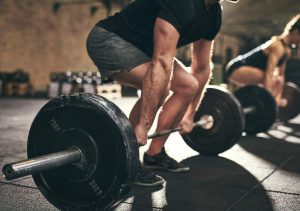It goes without saying that nobody exercises hoping for average results. When you hit the gym, you want to get the most out of every workout. It is actually easier to achieve than you think. All it takes are a few simple changes to your routine to see real results.
With so much conflicting advice on the internet and circulating the gyms, it can be confusing to work out what actually works. Luckily, there are plenty of scientific and evidence-based studies that have looked into this. So, if you are searching for information about how to get the most out of every workout, we have you covered.
Pump Iron & Lifting Weights
There is a common misconception that focusing only on cardio is the way to go. Yes, it builds up a sweat and gets your blood pumping. However, excessive cardio can lead to muscle loss. This muscle loss causes your metabolism to slow down, thus making your body less efficient in the long run.

Performing resistance training can increase your overall lean muscle mass. As muscle burns more calories than fat, your metabolism is boosted. 10,500 participants took part in a study performed by the Harvard School of Public Health. Individuals who performed 20 minutes of weight training each day gained less fat on their abdominal region over a 12-year period than those who only performed cardio (1).
Bottom Line: the amount of cardio that you do should be restricted to three times a week. Resistance and strength training should make up approximately 50% of your workout for maximum effect.
Build a HIIT Routine
High intensity Interval Training pushes your body to its limits then let you take a short rest. Minute for minute, HIIT provides more fat loss and cardiovascular benefits than you get from any other type of workout. A great example of HIIT is jogging on a treadmill.
Instead of jogging at a set intermediate pace, you jog at a comfortable pace for 10 seconds. You then up the speed to an all-out sprint for 20 seconds before reverting to a comfortable pace again for 10 seconds. This is repeated over a four minute period.
The University of wisconsin-la crosse’ Human Performance Lab performed a study looking at HIIT. Participants were made to do a variety of exercises including lunges, squats, burpees and push-ups over 20 minutes. The study found that each minute, approximately 15 calories were burned. This was twice as much as those performing a 20 minute run (2).
Bottom Line. HIIT exercises not only help you make the most out of every workout. But minute for minute, they burn more calories and provide more benefits to the body. As less time is needed to burn more calories, it is perfect for those with limited time for working out.
Variety Is Key
If you are honest with yourself, how many times do you do exactly the same exercises when working out? Here’s the thing. When you stick to the same routines your body knows what to expect and you get less out of your workout. Variety not only stops you from getting bored. It also keeps your body guessing.
Instead of working out exactly the same muscle groups every time… switch things up. In a study conducted by the East Tennessee State University, participants who only performed deep squats saw less fitness gains than those performing both full and deep squats (3).
This is true for every type of exercise. By performing different variations you work out different muscle groups. As an example, on a treadmill, you can increase the incline to work the glutes instead of the calves and thighs. Working more muscle groups contributes to an overall increase of muscle mass.
Bottom Line: variety is the spice of life and feeling the burn in new areas is a good thing. Aim to switch up your routine at least every 4 weeks to get the most out of every workout.
Eat, Drink and Sleep
Making the most out of every workout is more than simply hitting the gym. Improved health is more than breaking a sweat. It also involves good nutrition, sufficient hydration and a good night’s sleep. If you are performing high intensity interval training you need to give your body the fuel to run at maximum capacity.
A slice of toast or a bowl of oatmeal before your workout will improve both muscle growth and calorie expenditure. Post-workout, a high casein protein snack, such as cottage cheese or yogurt can help elevate protein synthesis elevated through the day (4). Protein synthesis is the action of protein being converted into muscle fibers. Ultimately, it can help lead to increased lean muscle mass.
Dehydration can have as much of a negative impact on your workout as a lack of calories and carbs can. General guidelines recommend that for each pound of body weight, 1 oz of water should be consumed. Dehydration also makes it more difficult for your body to recover post workout. It is a good idea to weigh yourself before and after you exercise and replace any lost fluids as soon as you can.

If you truly want to know how to get the most out of every workout, then quality sleep is vital. When you are sleep-deprived, your body is unable to recover properly after exercise. This is because sleep induces hormonal shifts that set the wheels of recovery in motion (5). The aim of the game here is not quantity, but quality. Getting 6 hours of deep sleep can provide more benefits than 9 hours of poor sleep.
Bottom Line: taking care of your body outside of the gym let’s your body take care of itself in the gym. Nutrition, hydration and rest are the foundations that lets you get the most out of your workout.
Final Thoughts
Aside from the above, there are a few other things you can do to help increase the benefits of every workout. Listening to music can help you push yourself harder and further.
Working out with a gym buddy can add a competitive edge to your exercise routine. And a massage can release the feel-good hormone Serotonin, resulting in an improved sense of well-being.
Putting the above into action should see you well on your way to better health and fitness levels. It is surprising that such a small changes can have such a big impact on the effectiveness of your workout.
References:
1- http://onlinelibrary.wiley.com/doi/10.1002/oby.20949/abstract
2- http://www.ncbi.nlm.nih.gov/pmc/articles/PMC3772611/
3- http://www.ncbi.nlm.nih.gov/pubmed/26544089


